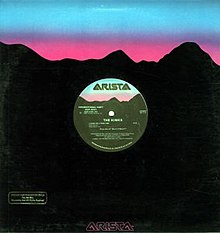Living on a Thin Line
| "Living on a Thin Line" | ||||
|---|---|---|---|---|
 |
||||
| Single by The Kinks | ||||
| from the album Word of Mouth | ||||
| B-side | "Sold Me Out" | |||
| Released | January 1985 | |||
| Format | 12" single | |||
| Recorded | June 1983 – September 1984 at Konk Studios, London | |||
| Length | 4:16 | |||
| Label | Arista | |||
| Writer(s) | Dave Davies | |||
| Producer(s) | Ray Davies | |||
| The Kinks singles chronology | ||||
|
||||
"Living on a Thin Line" is a track written by Dave Davies and performed by The Kinks on their 1984 album, Word of Mouth.
"Living on a Thin Line" is one of two songs on Word of Mouth written by Dave Davies (the other being Guilty). Davies said, in his biography Kink, that the track was influenced by The Kinks' long and difficult career, along with his hatred toward politicians. The song's lyrics compare the barbaric times of medieval England to today, saying that "inside we're the same as we ever were".
"Living on a Thin Line" was first released on Word Of Mouth, but has since been released as a 12-inch promotional radio single (backed with "Sold Me Out") in America, and on numerous compilation albums, such as Come Dancing with the Kinks, Lost & Found (1986-1989), The Ultimate Collection, and Picture Book. The song has also been played live by both The Kinks and Dave Davies.
The song, despite not having much commercial success, has become a fan-favorite. The track has also been played three times in the American TV show The Sopranos' 2001 episode "University". Producer Terence Winter has said that it is the series' most asked about song.
"Living on a Thin Line" has been praised as one of Dave Davies's greatest songs. David Fricke of Rolling Stone said that "in 'Living on a Thin Line' – a dark variation on Ray's own death-of-England's-glory songs – brooding, goose-stepping chords and moping Pink Floyd synths underscore the desperate effectiveness of Dave's nervous croon."Robert Christgau said, in his review of Come Dancing with The Kinks, that the track is the "second-best" on the album (to "Come Dancing"), and "'There's no England now,' he opines, which explains a lot."
...
Wikipedia
